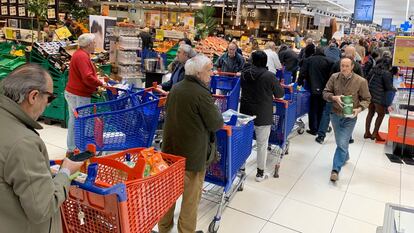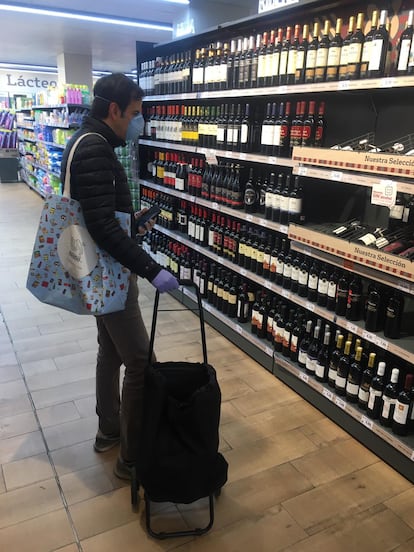Why are Spaniards buying more beer and chocolate under the coronavirus lockdown?
Psychologists share their thoughts on why shoppers have swapped toilet paper for wine during the first two weeks of the state of alarm

Shoppers in Spain have been buying more alcohol since the Spanish government declared a state of alarm in a bid to slow the coronavirus pandemic. The sale of beer rose by 77.65% with respect to the previous week, while wine jumped by 62.7% and alcoholic drinks by 36.58%, according to a study in the consumer magazine Inforetail, which is supported by the Spanish Association of Distributors, Self-Service Stores and Supermarkets (Asedas).
The study also shows that the large purchases seen in the lead up to the lockdown eased during the first two weeks of confinement. The peak of the shopping frenzy was reached between March 11 and 14, just before Prime Minister Pedro Sánchez announced the state of alarm.
“In these two weeks, the number of visits made by each shopper has dropped and the size of each individual purchase has increased slightly, in accordance with the recommendations of the health authorities. These shopping purchases reflect the lockdown the Spanish population is under,” says Felipe Medina, the secretary general of Asedas, which represents the main businesses in the supermarket sector as well as 19,100 establishments.
If I can’t go out shopping, or to the cinema or to dinner, what am I going to do?Claudia, resident of Lavapiés
While the demand for toilet paper has stabilized, other products have seen a spectacular rise in sales, such as olives (+93.83%), potato chips (+87.13%), chocolate (+79.04%), ice cream (+76.19%) and anchovies (+60%). What’s more, according to figures from the Ministry of Agriculture, Fisheries and Food, the sale of flour has shot up by 196% with respect to the previous week. It would appear that people have decided that the best way to cope with the lockdown conditions is to set up a bar and a cake shop at home.
But what is behind this change in shopping habits? Is there a sociological or psychological explanation for it?
“From Monday to Thursday we have a beer around 8.30pm and from Friday to Sunday we have some vermouth and spirits as we videochat with friends.” Claudia and Raúl are both in their 30s and live in a 55-square-meter apartment in the Madrid neighborhood of Lavapiés. When asked how they are managing being confined to their homes for a third week, they reply: “We’re coping.” They say they have experienced moments of stress and anxiety. Now they only shop once a week and the last time they went to the supermarket they bought some bottles of wine, beer, potato chips and chocolate. “If I can’t go out shopping, or to the cinema or to dinner, what am I going to do? I try to have a routine: I get up, I have breakfast, work, eat, do pilates and at 8.30pm I have a glass of beer,” says Claudia. “I wait eagerly for 8.30pm because that’s our small moment to disconnect.”
She is not the only one to feel this way. The wine sector saw an extraordinary rise in sales in March in Madrid. “We are seeing numbers as though it were Christmas,” says Julián Ribalda, the director of the online wine store Lavinia, which is one of the largest in the sector. “We have detected a small change: if our wines are normally bought in the €15 to €20 range, now it is in the €8 and €15 range with brands such as Finca Resalso, Viña Real Crianza, Luis Cañas Crianza,” says Ribalda. What’s more, nearly half (46%) of all Lavinia’s customers in the past two weeks have been new. “They are customers who before normally bought wine from the supermarket or in large shopping centers, and are now moving toward online shopping,” he explains.

So what is the psychological reason driving this change? According to Carmelo Vázquez, professor of psychopathology at Madrid’s Complutense University, “this reflects the ability to give ourselves rewards and treats in these times.” After the 2001 September 11 terrorist attack on New York and the 2004 Madrid train bombings, Vázquez completed numerous studies on the post-traumatic stress experienced by people in those cities in the aftermath of the attacks.
According to the professor, these two events, in spite of the obvious differences, bear certain similarity to what is currently happening. “Despite the widespread thinking that everything is going badly, people are extraordinarily resilient,” says Vázquez. “Back then, the studies [following the terrorist attacks] showed us that the level of post-traumatic stress did not reach 7%. Now there is a lot of preparatory alarm, but people are handling it very well. One of the phases is exactly that: drink beer, alcohol and eat potato chips. This has a therapeutic effect. The consumption of alcohol and candy increases endorphins, which happens in high moments of stress.”
You don’t eat steak when you are stressed. What the body wants is sugar and fatPsychologist Olga Castanyer
Olga Castanyer is a specialist in clinical psychology and author of the book La Asertividad: Expresión de una Sana Autoestima (Assertiveness: the expression of healthy self-esteem). She says she also “meets up to have some beers with friends on Skype.” According to Castanyer, demand for beer has soared in the past two weeks due to the high levels of stress about the coronavirus crisis. “You don’t eat steak when you are stressed. What the body wants is sugar and fat,” she explains. “When we are locked up, our brains ask us for a prize: like chocolate, candy or simply beer. We are used to living according to certain paradigms and we have never seen the one we are in. That’s why it’s good to continue the social customs of before: glass of wine at home, olives, the Mediterranean culture.”
It’s a theory that’s backed by Josep Lobera, a sociologist at the Autonomous University of Madrid. “You have to take a good look at the data. The consumption of limeflower tea and chocolate reduces anxiety. Others manage it with alcohol or video games. They are all different forms of escape,” he explains.
In the wine aisle of a supermarket in Madrid, Carlos Alonso, 46, is looking at bottles with a face mask on. “I came to buy wine for my mom. She has written to me just now and says she wants a Fino.” Alonso is an interior designer. “I am also buying for myself. I try to escape with a glass. There’s great boredom these days.” Supermarket cashiers say they have also noticed that more people are buying alcohol.
There is also more demand for delivery services such as Glovo, where shopping is delivered by cyclists. “The past two weeks I have only been buying beer, wine, chocolate and candy,” says Colombian Glovo rider Andrés Garabito outside a supermarket in Madrid.
“Everything we are seeing these days in shopping carts is what distinguishes scarcity from abundance, which are simply small treats at the end of the month,” says Vázquez. “There will be different peaks. Anchovies and potato chips will be replaced by other products. It’s very difficult to know what is going to happen in the next few days, but we have to highlight the solidarity that we are seeing like the activities at home and the things that have spontaneously started.”
English version by Melissa Kitson.
Tu suscripción se está usando en otro dispositivo
¿Quieres añadir otro usuario a tu suscripción?
Si continúas leyendo en este dispositivo, no se podrá leer en el otro.
FlechaTu suscripción se está usando en otro dispositivo y solo puedes acceder a EL PAÍS desde un dispositivo a la vez.
Si quieres compartir tu cuenta, cambia tu suscripción a la modalidad Premium, así podrás añadir otro usuario. Cada uno accederá con su propia cuenta de email, lo que os permitirá personalizar vuestra experiencia en EL PAÍS.
¿Tienes una suscripción de empresa? Accede aquí para contratar más cuentas.
En el caso de no saber quién está usando tu cuenta, te recomendamos cambiar tu contraseña aquí.
Si decides continuar compartiendo tu cuenta, este mensaje se mostrará en tu dispositivo y en el de la otra persona que está usando tu cuenta de forma indefinida, afectando a tu experiencia de lectura. Puedes consultar aquí los términos y condiciones de la suscripción digital.









































